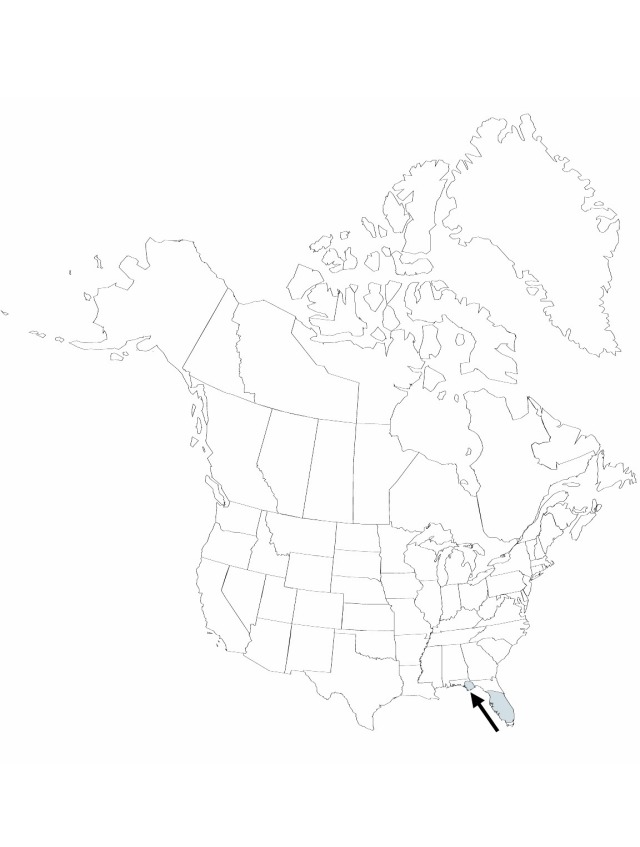Difference between revisions of "Callisia ornata"
Journal of the Arnold Arboretum 70:118. 1989.
FNA>Volume Importer |
imported>Volume Importer |
||
| (6 intermediate revisions by 2 users not shown) | |||
| Line 7: | Line 7: | ||
|year=1989 | |year=1989 | ||
}} | }} | ||
| − | |basionyms={{Treatment/ID/ | + | |special_status={{Treatment/ID/Special_status |
| + | |code=E | ||
| + | |label=Endemic | ||
| + | }} | ||
| + | |basionyms={{Treatment/ID/Basionym | ||
|name=Cuthbertia ornata | |name=Cuthbertia ornata | ||
|authority=Small | |authority=Small | ||
| + | |rank=species | ||
| + | |publication_title=Man. S.E. Fl., | ||
| + | |publication_place=259. 1933 | ||
}} | }} | ||
|synonyms={{Treatment/ID/Synonym | |synonyms={{Treatment/ID/Synonym | ||
|name=Tradescantia rosea var. ornata | |name=Tradescantia rosea var. ornata | ||
|authority=(Small) E. S. Anderson & Woodson | |authority=(Small) E. S. Anderson & Woodson | ||
| + | |rank=variety | ||
}} | }} | ||
|hierarchy=Commelinaceae;Callisia;Callisia ornata | |hierarchy=Commelinaceae;Callisia;Callisia ornata | ||
| Line 28: | Line 36: | ||
|habitat=Coastal strand | |habitat=Coastal strand | ||
|distribution=Oak;pine;and palmetto woods and scrub;occasionally fields or roadsides;usually in sandy soil;Fla. | |distribution=Oak;pine;and palmetto woods and scrub;occasionally fields or roadsides;usually in sandy soil;Fla. | ||
| − | |discussion=<p>A white-flowered form has been described from central Florida as Callisia ornata forma leucantha Lakela (O. Lakela 1972), but such color forms are hardly worth taxonomic recognition.</p> | + | |discussion=<p>A white-flowered form has been described from central Florida as <i>Callisia ornata</i> forma leucantha Lakela (O. Lakela 1972), but such color forms are hardly worth taxonomic recognition.</p> |
|tables= | |tables= | ||
|references= | |references= | ||
| Line 37: | Line 45: | ||
-->{{#Taxon: | -->{{#Taxon: | ||
name=Callisia ornata | name=Callisia ornata | ||
| − | |||
|authority=(Small) G. C. Tucker | |authority=(Small) G. C. Tucker | ||
|rank=species | |rank=species | ||
| Line 50: | Line 57: | ||
|publication title=Journal of the Arnold Arboretum | |publication title=Journal of the Arnold Arboretum | ||
|publication year=1989 | |publication year=1989 | ||
| − | |special status= | + | |special status=Endemic |
| − | |source xml=https:// | + | |source xml=https://bitbucket.org/aafc-mbb/fna-data-curation/src/2e0870ddd59836b60bcf96646a41e87ea5a5943a/coarse_grained_fna_xml/V22/V22_186.xml |
|genus=Callisia | |genus=Callisia | ||
|species=Callisia ornata | |species=Callisia ornata | ||
Latest revision as of 20:29, 5 November 2020
Herbs, perennial, not or only scarcely cespitose, erect. Roots persistently densely woolly. Stems 20–50 cm. Leaves strongly ascending; basal leaf sheaths glabrous to puberulent; blade linear, (2–)10–25 × 0.1–0.4 cm (distal leaf blades much narrower than sheaths when sheaths opened, flattened). Inflorescences: bracts not distinct from bracteoles, usually minute, 1–3(–7) mm, scarious (rarely somewhat herbaceous). Flowers pedicellate; pedicels 1–1.5 cm; petals pink to rose, 9–13 mm; stamens 6; filaments bearded; ovary 3-locular. Capsules 3-locular, 3–5 mm. Seeds 1.5–2 mm.
Phenology: Flowering spring, fall.
Habitat: Coastal strand
Distribution

Oak, pine, and palmetto woods and scrub, occasionally fields or roadsides, usually in sandy soil, Fla.
Discussion
A white-flowered form has been described from central Florida as Callisia ornata forma leucantha Lakela (O. Lakela 1972), but such color forms are hardly worth taxonomic recognition.
Selected References
None.